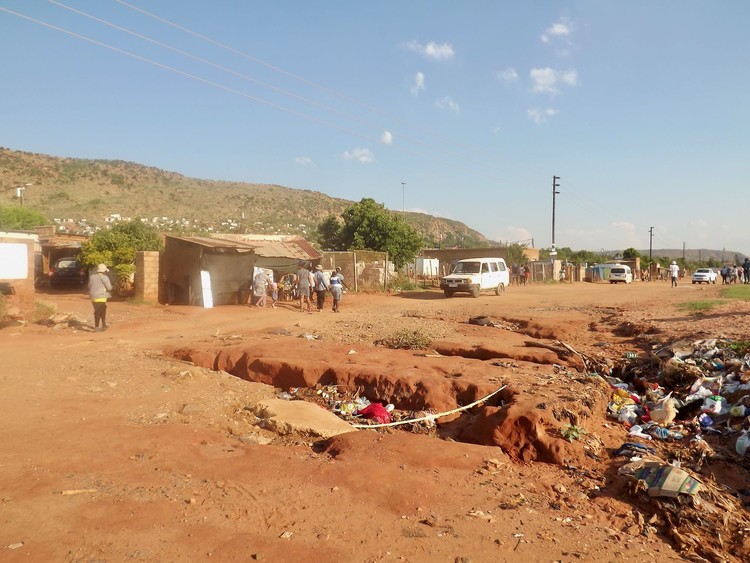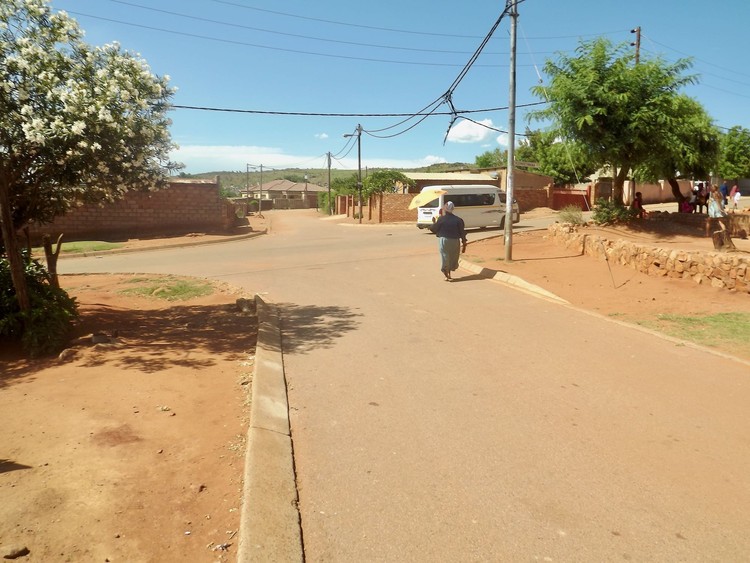Roads fall apart while bureaucracy moves at snail’s pace in Mamelodi
City of Tshwane says Stoffel Park informal settlement must first be approved for township development before it fixes the roads
This two-way street in Stoffel Park, Mamelodi, becomes one-way because of the poor maintenance of roads in the informal settlement. Photos: Warren Mabona.
Just 200 metres away, in adjacent formalised Lusaka, the roads look very different.
Residents of Stoffel Park informal settlement in Mamelodi say they are fed up with the poor condition of their roads. They don’t understand why the City of Tshwane is able to provide them with basic services, such as electricity and toilets, but unable to do even superficial maintenance on their roads.
The settlement’s unnamed roads are rutted, potholed, eroded by dongas and bumpy with rocks. Residents complain that their vehicles get damaged by the bad roads. They say that at night, with their vehicles crawling along the road, they are vulnerable to hijackings.
“Waiting for other cars to pass on this bad road delays me a lot and I can’t do my job properly,” says taxi driver Jack Mahlangu. “I have to spend money to patch up one or two tyres every week. My passengers sometimes complain about being late for work. The City must fix this road and our streets.”
Resident Mpendulo Motha said, “Filling these holes with sand and rocks will take the City only a few days … Ambulances and police vans take a long time to arrive here when they respond to emergencies.”
Food kiosk owner Rose Mashaba said that when it rains and the roads turn to mud people are unable to access her shop.
Meanwhile in adjacent Lusaka township, a road away, the roads are in good condition. But some Lusaka residents have to pass through Stoffel Park main road to go to work in places such as Hatfield.
“There is normally a long convoy of cars … in the mornings and afternoons because taxis and other cars move very slowly. The City must fix that road,” said Lusaka resident Sylvia Nkadimeng.
City spokesperson Lindela Mashigo said only when Stoffel Park is approved as a township can water, sewer, stormwater and road infrastructure be installed.
Stoffel Park was formed in 2007, after residents occupied land earmarked for the Mahube Valley development. The City started the formalisation process for Stoffel Park in 2013. It allocated permanent stands for 2,350 residents and provided electricity and rudimentary sanitation.
The application for township establishment is currently circulating for comments, said Mashigo. The application process should be completed by April 2024.
The City did not respond to our questions about what it had done regarding formalisation for the ten years between 2013 and 2023, nor offer an explanation why this should stop it doing basic maintenance.
Next: Asbestos roofs still haven’t been replaced in Stellenbosch municipal housing
Previous: Activists want government to do more to register domestic workers
Letters
Dear Editor
The issue of roads is not affecting Stoffel Park residents only. I live in Mamelodi RDP EXT18 and ever since I got here there has never been tar roads even though we have government houses, toilets, street lights etc. Cars get damaged, especially when it's rainy. The government is really failing us. The roads only get scrapped when there are elections approaching. We do require tar roads as well because it's not only that we do not get our emergency care on time, but our properties are also getting damaged.
What are people voting for if we're not being given the essential rewards of having a permanent residence? The last time RDP had tar roads was during apartheid times, but now our leaders are just being greedy and selfish.
© 2023 GroundUp. This article is licensed under a Creative Commons Attribution-NoDerivatives 4.0 International License.
You may republish this article, so long as you credit the authors and GroundUp, and do not change the text. Please include a link back to the original article.
We put an invisible pixel in the article so that we can count traffic to republishers. All analytics tools are solely on our servers. We do not give our logs to any third party. Logs are deleted after two weeks. We do not use any IP address identifying information except to count regional traffic. We are solely interested in counting hits, not tracking users. If you republish, please do not delete the invisible pixel.




